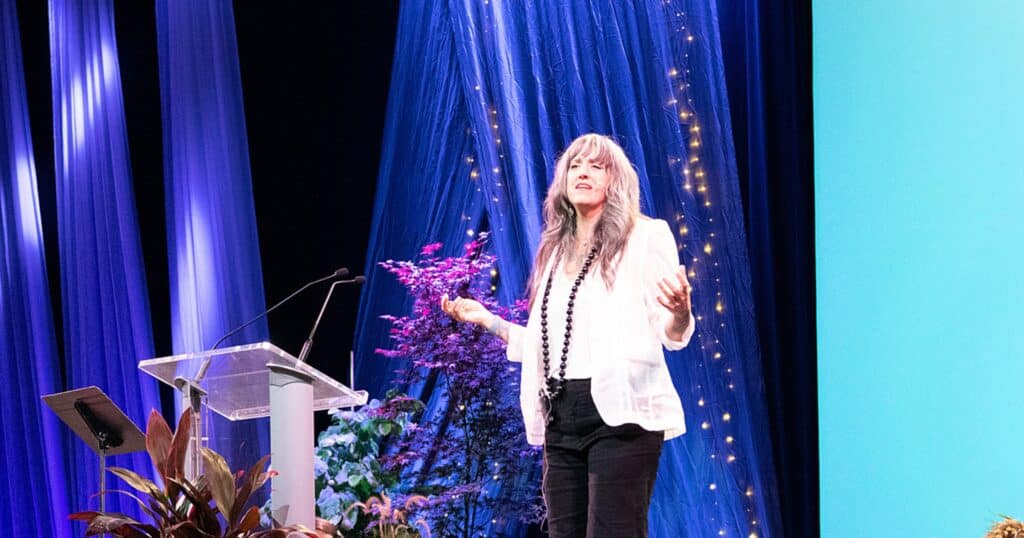Comfort, not keynote: Nadia Bolz-Weber speaks to General Synod about hope amid ‘fear, anxiety, worry and regret’
The Rev. Nadia Bolz-Weber began her keynote to the 34th General Synod of the United Church of Christ by saying she wasn’t giving a keynote at all.
Instead, she said, her speech was a “thinly veiled attempt to comfort myself.”
Bolz-Weber, a renowned Lutheran pastor and best-selling author, spoke to 2,000 Synod attendees Saturday, July 1 about the global anxiety levels of the last few years and where to find hope in the face of fears and regrets.
She started out by listing nine things that are currently “scaring the heck” out of her, including a society that seems to be fraying at the edges; the safety of her Black friends, gay son and young adult daughter; and the possibility that we have already lived through the most peaceful and prosperous period of history without realizing it, and that we can’t get it back.
“I don’t know about you,” she said to the crowded plenary hall, “but some days I have enough fear, anxiety, worry and regret to fill this whole room. And I have yet to find a vision statement or a church consultant or a five-year plan or a lifestyle change or a meditation app that is an effective remedy for fear, anxiety, worry and regret.
“But I have found parts of our Christian faith that bring the goods … and I really need to remind myself of those things right now,” she continued. “And so, this morning, I am preaching to myself, and I am allowing you to overhear it.”
Bolz-Weber went on to speak on those themes individually — fear and anxiety, worry, regret, and hope — and how scripture has addressed them.
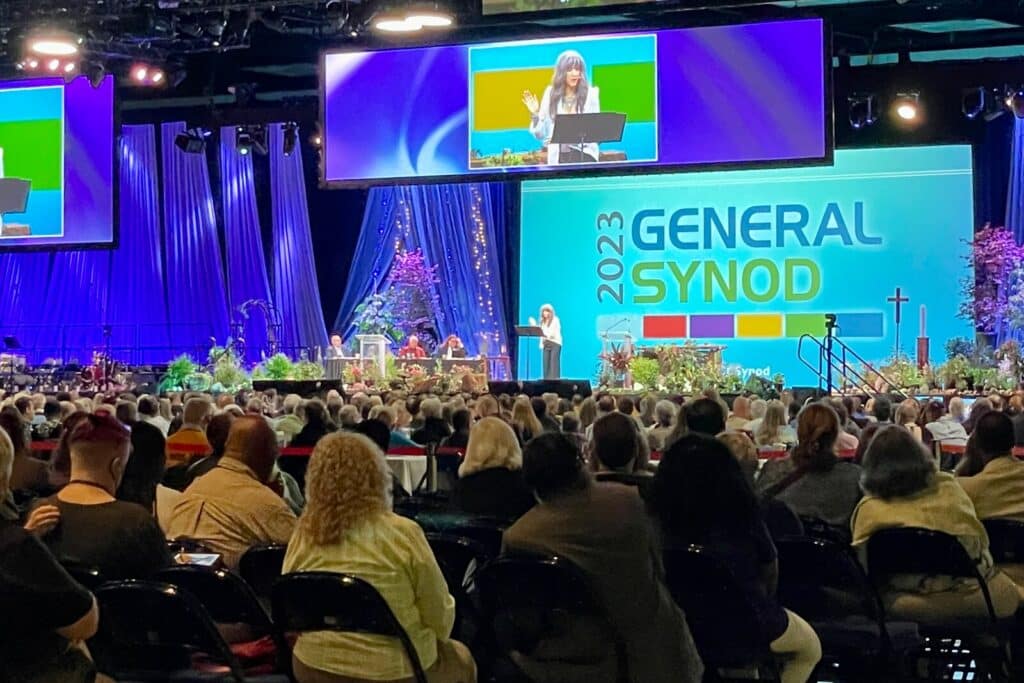
Fear and anxiety
First up: fear and anxiety. Bolz-Weber talked about how institutions that she had never thought to doubt before – such as democracy — are starting to show cracks.
She talked about the temple in Jerusalem, where through the centuries various churches and temples and mosques replaced each other at that same site, with each religion seeing themselves as “king of the Holy Hill” favored by God. She compared how they must have felt when they were on top to how mainline Protestants felt in the 1960s, when churches were full.
But then, she asked, did each group feel that God had abandoned them when they were replaced by someone else?
“It is always tempting to say — when our lives are good — that it is because God is good,” she said. “But when the walls fall down, what are we left with?”
“Wars will happen, there will be destruction and famine, there will be pandemics and fake news, there will be the Left Behind series of books,” she went on. “There will be churches that close, there will be family trouble, there will be loneliness, there will be natural disaster …. Aal of this will happen; all of it is real.”
And, she added, almost none of it is in our control, which is a “real affront to popular notions of wellness and so-called spirituality these days, when there is a million-dollar industry convincing us that we can manifest everything we want, that we can pray or positive-think our way into never getting a cancer diagnosis or never needing financial help.
“I get the appeal. Powerlessness is terrifying. But what about when the thing happens with our life, in our churches, in our society, that no amount of purpose-driven drivel could have ever prevented?”
That, she said, is when we need to listen to Jesus, who told us: “Do not be afraid.”
“Because these things may rock your world, but they cannot harm your soul,” she said.
Regrets
Part two of Bolz-Weber’s address centered on regrets.
“Sometimes, I get stuck in tidepools of resentment toward myself and others. Stuck, swirling in an eddy of my own remorse. Caught in the shame of what I have done, what I have left undone, what has been done to me,” she said. “I have yet to see a single thing from a lifestyle influencer on Instagram who has freed me from it in the way that Jesus has.”
Bolz-Weber recounted going on a silent retreat and spending it filled with regret. Until, she said, 11 words came to her: “But what if you’ve already been forgiven of all of that?””
“I mean, the audacity of God,” she said. “My cheeks were streaming with tears before I was even aware I had started crying. The man Martin Luther once said it is not God but the devil who rummages through our garbage looking for our sins to rub our noses in it.”
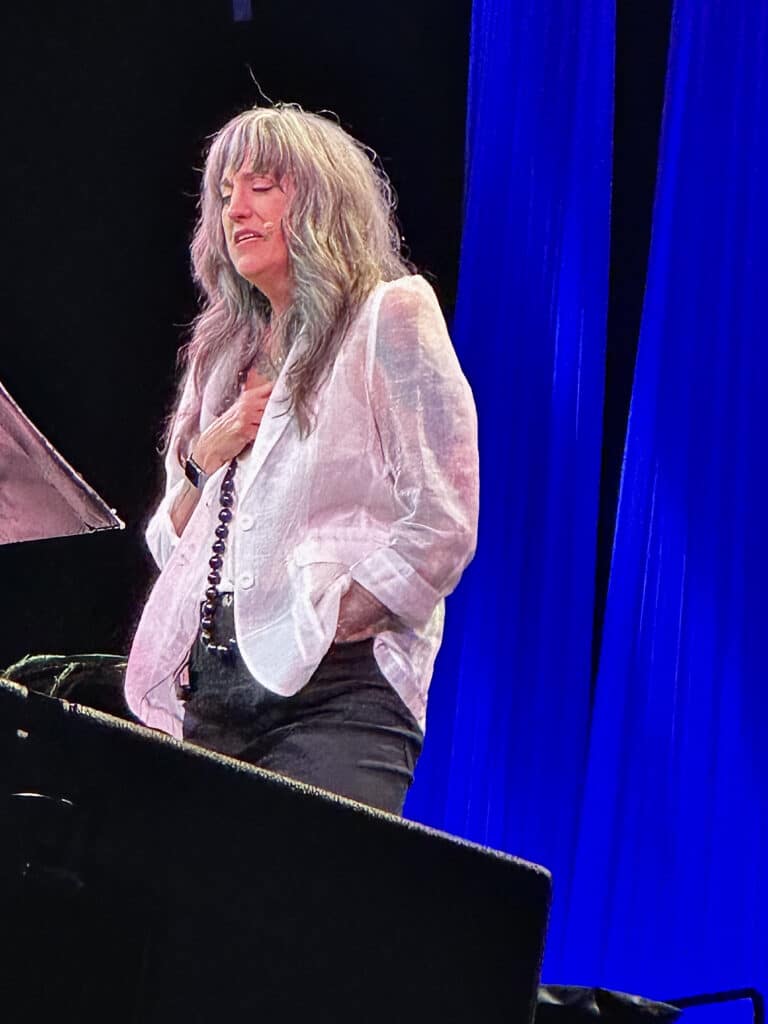
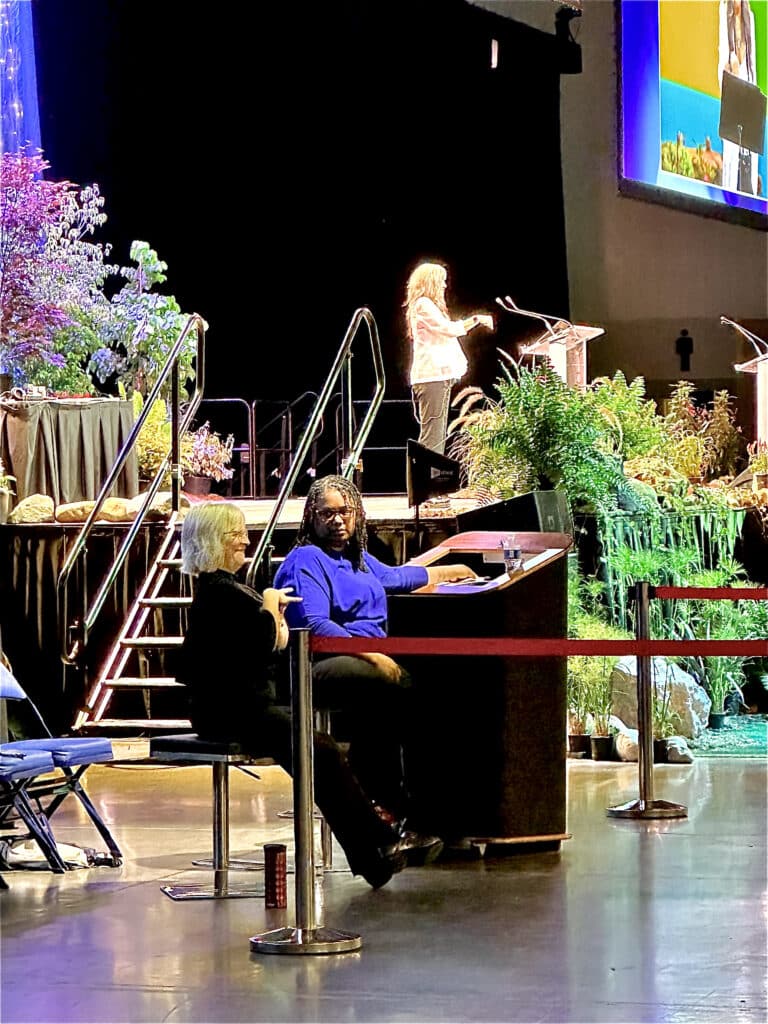
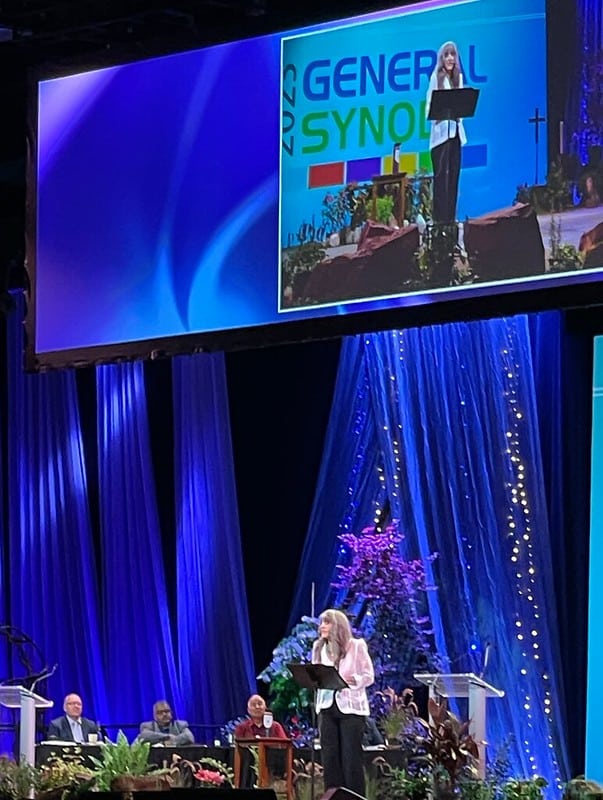
Bolz-Weber said the world may send a message that our failings are inescapable and unforgivable, but that is simply not true.
“If Jesus can defeat death and the devil, I’m pretty sure giving you his grace isn’t going to be that hard for him,” she said. “In Christ, who you are is not to be found in the garbage can of your life. Who you really are is forgiven.”
Bolz-Weber said she wishes the church talked as much about forgiveness as Jesus did, and she lambasted those who have “weaponized talk of sin” and put conditions on forgiveness or on God’s love.
“Christianity Is not supposed to be about controlling the masses. Christianity is not supposed to be some mild Elks Club with Eucharist, it’s not supposed to be about morality and superiority. Christianity is supposed to be about raising the dead,” she said.
Worry
Her third topic was worry.
She talked about how worrying that the world is going to collapse or about any of the other things on her list, “doesn’t do one thing” to keep her safe and secure. But, she said, worrying does take something away.
Referencing Matthew, Bolz-Weber quoted Jesus as directing those carrying worry to look to the birds in the sky, who do not worry about reaping or sowing but are still fed by God.
“I think it’s more than him saying, ‘Look, literally, birds are better at trusting God than you,’” she said. “I think Jesus gets that the beautiful things that surround me are meant to be enjoyed today. And that they are the exact same things I totally miss out on when I’m busy worrying about tomorrow.”
Bolz-Weber said that no one has yet discovered another place in the universe with the exact conditions to support life as we know it.
“13 billion light years across, and only here are there birds and flowers and puppies and pizza and Beyoncé,” she said.
Hope
The fourth thing Bolz-Weber spoke about was hope.
“I want to admit to you that sometimes my anxiety can make prayer difficult,” she said. “So, if you too are anxious and can’t pray … maybe what we can do is just pray for a conversion of our anxiety. Because when anxiety is converted, do you know what it becomes? It becomes hope.
“If you have anxiety now, you are almost hopeful,” she said, drawing laughter.
Bolz-Weber apologized for not having anything “sexier” to offer than “Jesus, prayer and the Bible,” saying: “Those are the only load-bearing structures I know of right now.”
She said scripture gives us an important perspective in anxious times.
“When all we can see and feel and think about is all the personal and political crap happening now, it’s important to remember we are part of an old, old story. One that starts in the beginning of time and brushes the skin of the present and reaches into the promised future, and the promise that God is not done,” she said.
She went on to say our hope is not in the Dow Jones, in the government, in the nonprofit industrial complex but in the God of Abraham and Sarah and Isaiah and Mary Magdalene and Mother Teresa.
“When we stand on the rock of this big story, with one hand reaching back to the hope of the prophets and one hand reaching forward to the promises of God, we can stand firmly in the reality of the present and not have that reality consume us,” she said.
“Despite our anxieties of faith, we still dare to get our hopes up,” she said.
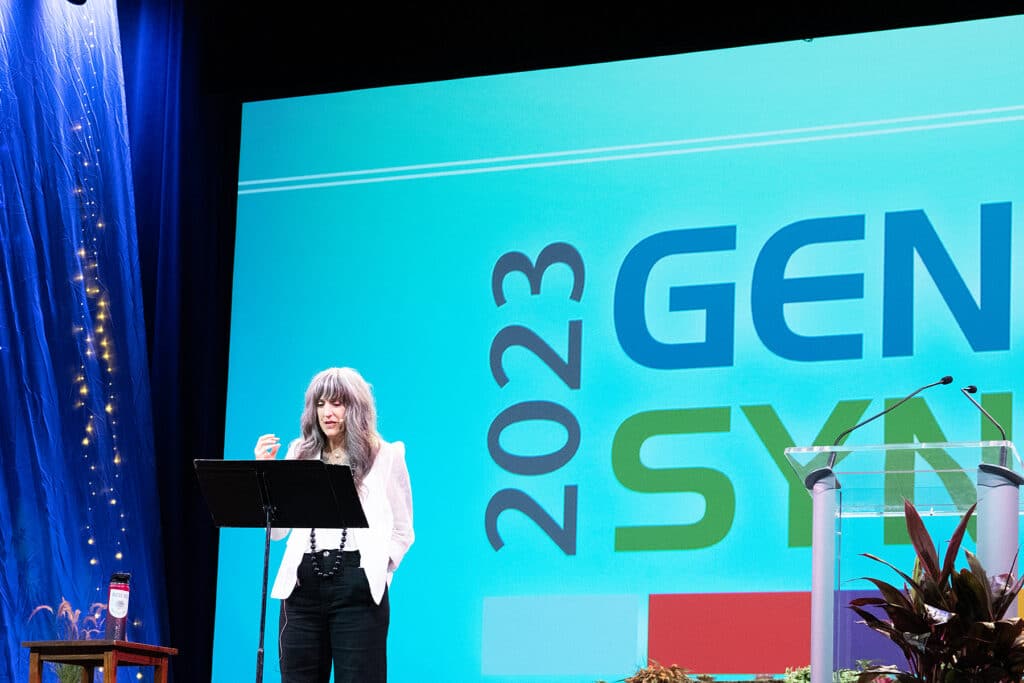
Questions and opinions
Bolz-Weber finished her time taking some questions from the audience.
One person asked how to balance forgiveness of the sins of ancestors with responsibility to repair the wrongs they committed. Her response was that “forgiveness is not the same as exoneration” and said clearly there is much work to do around systemic issues. She called for a system of restorative justice in the United States.
Another person asked how people can be OK with the closing of churches when those institutions are what hold communities together.
“Our deepest faith can’t be in our institutions,” Bolz-Weber responded. “Our deepest faith has to be in God’s faithfulness to us. When they do let us down — and they will — it doesn’t destroy our relationship to God.
“I love the church. I don’t want to see churches close. I don’t want to see denominations do badly. But at the same time, if institutions end up failing in some way, the church will be fine.”
Another person asked Bolz-Weber how she manages to hold on to hope even when her anxiousness is palpable.
“I sometimes have to borrow other people’s hope, other people’s faith. Sometimes, we are the one lowering our friend through the roof to Jesus, and sometimes we’re the ones being lowered,” she said.
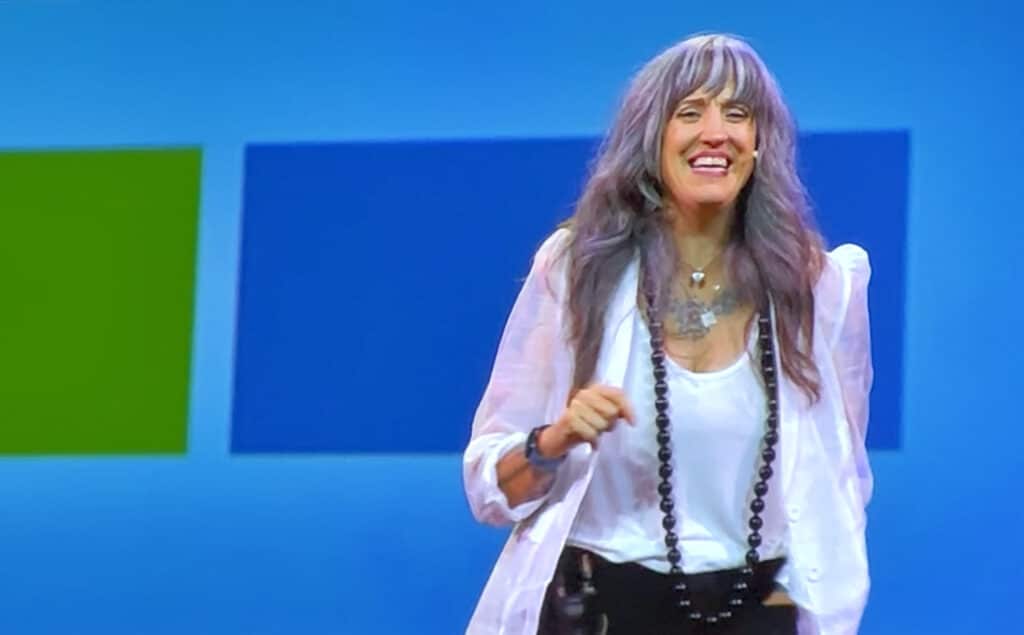
Tiffany Vail, a General Synod newsroom volunteer, is the director of media and communications for the Southern New England Conference.
Content on ucc.org is copyrighted by the National Setting of the United Church of Christ and may be only shared according to the guidelines outlined here.
Related News
A Moment of Silence
The weekend news was alarming. Two students shot and killed with 9 injured at Brown University...
Read MoreIn hope-filled worship service, UCC and United Church of Canada celebrate full communion past and future
On Saturday, Dec. 13, many from the United Church of Christ (UCC) and the United Church of...
Read More‘A Gift of God to the World:’ Christmas greetings from the General Minister and President
As Christmas quickly approaches, UCC General Minister and President/CEO the Rev. Karen Georgia...
Read More